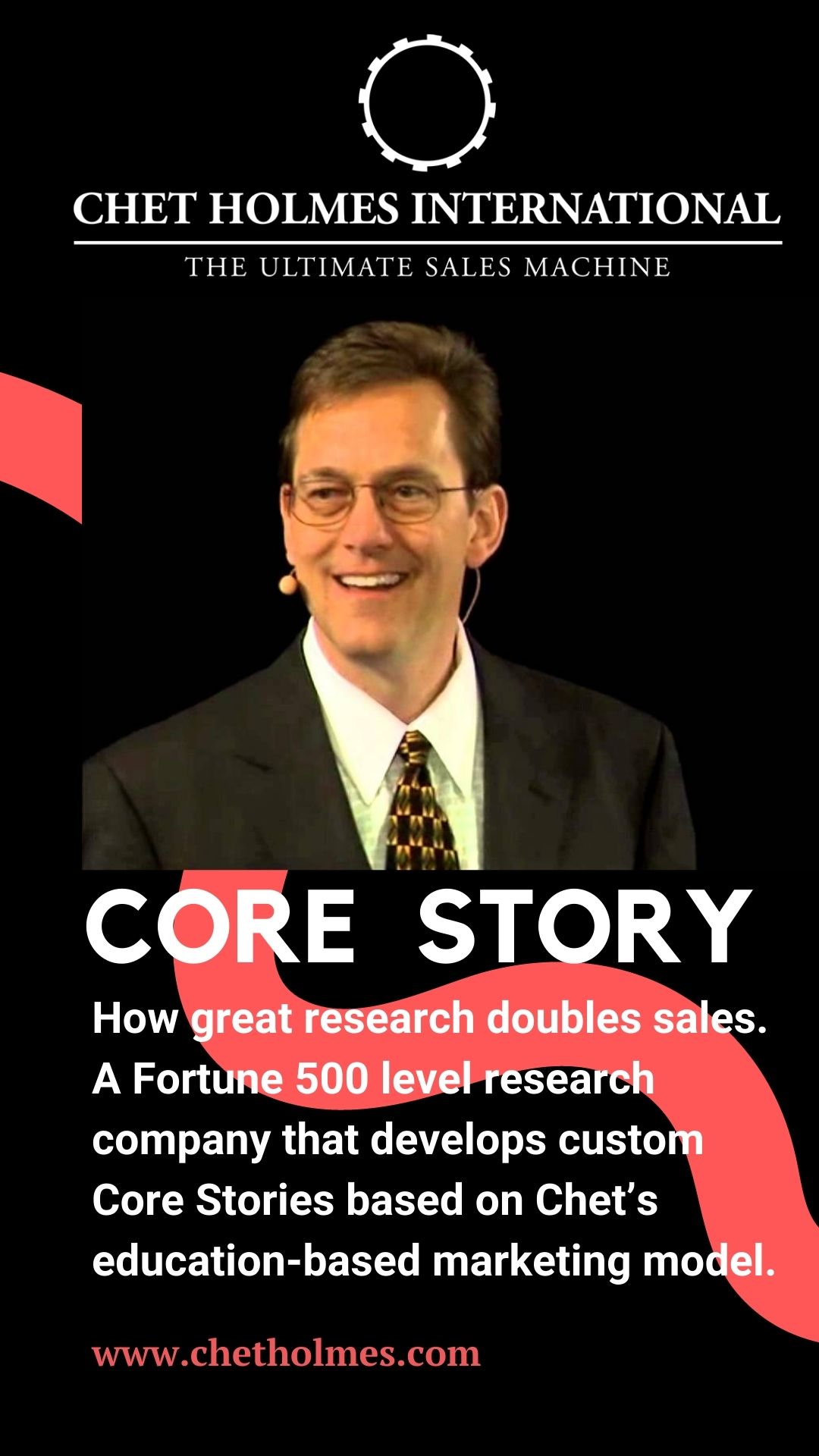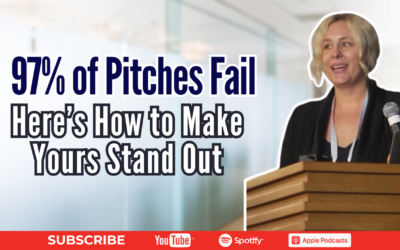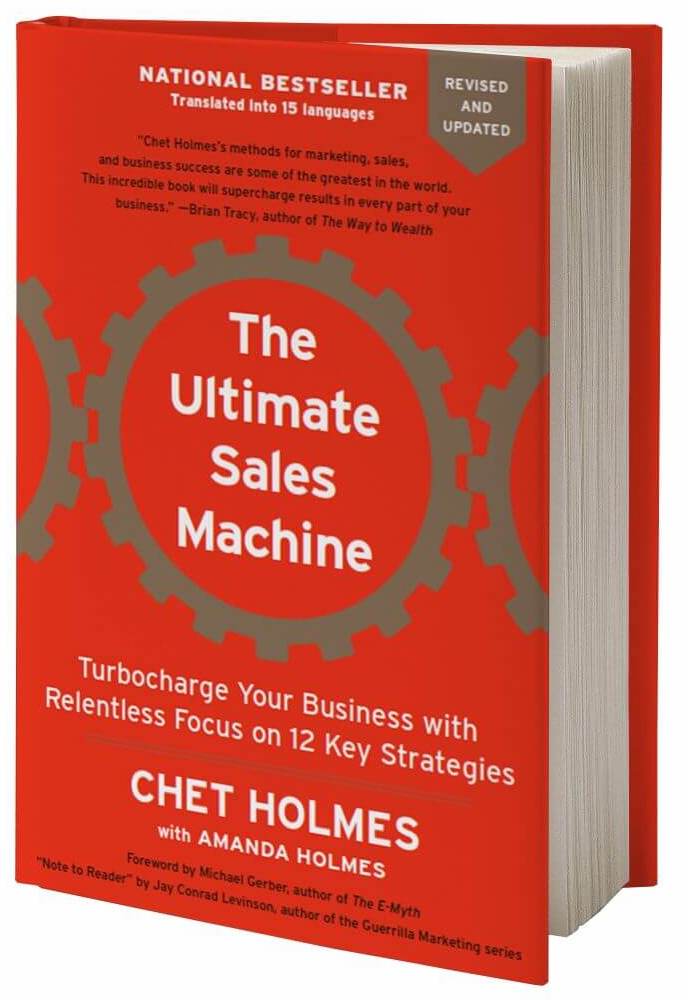Did you know that 75% of web leads are wasted?
Your website is more than likely costing your business revenue.
In this week’s episode, you’ll discover:
-The critical mistakes companies make on their website that costs them leads and sales
-The 5-prong checklist to determine if your website is effective
-Top strategies to transform your website into a conversion powerhouse that brings in leads and convinces them to become loyal, paying customers.
Are you wasting your hard earned leads?
Watch this episode now to uncover the 5 Biggest Mistakes Companies Make on their Website that are costing leads and sales.
Continued Learning: Purpose for Your Website
- Want to know what’s keeping you from doubling your sales in the next 12 months? Take our quick QUIZ to get answers: Howtodoublesales.com
- If you’d like to have a profound breakthrough in your business, schedule your breakthrough call with a LIVE expert here: Chetholmes.com/Breakthrough
- Claim your FREE chapter 4 from the top 10 most recommended marketing and sales books of all time! Visit: Ultimatesalesmachine.com to find out how you Create 9X More Impact from every move you’re already making to win clients!
TRANSCRIPT:
*this transcript was mostly generated by AI, please excuse any mistakes 
Amanda Holmes: [00:00:00] Hello, everybody. Welcome to the CEO Mastery Show. Amanda Holmes here, and today we’re going to talk about revamping websites.
Amanda Holmes: There are five biggest mistakes that companies make when trying to revamp their website. We have people coming every day. Before they revamp their website, they want to talk to us, and it just keeps becoming such an issue that I decided to do an episode on it.
Why is this important? Well, Orbit Media did an analysis of the top 200 marketing companies and they looked at how often they did major redesigns of their website and they found that the average company went two years and seven months with their current web design [00:01:00] before they switched.
And very often you’ll see this where the Suggested amount of time between shifting of a website design is roughly about three years at this very point
it’s important considering that a successful custom website design process takes roughly nine months.
Oh, long time. And if you’re hiring a team to help you, it could run anywhere between 15, 000 to 30, 000.
If you have a more complex website, it could be from 40, 000 to 75, 000. If you have a hundred pages and all this additional unique features.
And then the worst, which I literally see day after day, is you spend those hours, those days, those months, working slave laboring over this website, and then you’ve created this Ferrari, when really all you need is a lawnmower to mow the lawn. It looks beautiful, but it can’t even do the intended use.
So what is the intended use [00:02:00] of a website?
It should look pretty. It should scream excellence. It should make people say, wow, that color palette is top notch. Nobody uses those purples and blues like CHI. No, right. What’s the number one goal of a website? It should convert. It should generate leads to generate sales. It should generate leads to generate sales.
I’m repeating it over and over again for us to remember what is the purpose of a website is to generate leads, to bring us to buyers. Very simple. And yet we miss it. So I’m going to cover those five things.
And I understand why this happens because the minutiae of a website, there’s so many minor details, so many things to consider, but then we lose the bigger picture of what strategic objectives we’re working to accomplish.
So let me go through the five biggest mistakes that companies make when revamping their website.
Number one, very frequently, companies have not spent the time to understand [00:03:00] who is their ideal buyer. Who is the person that pulls out the credit card, the checkbook, to pay for your product or service? Do you know who that is and you have it so clear that on your website it speaks directly to them? They read it and say, wow, this is for me because I’ll tell you, I was just thinking about this.
I had a client that was in the health care space and 90 percent of their revenue came from one ideal buying persona. And then 10 percent of their revenue came from another kind of buyer. Their whole website was dedicated to the buyer that spends 10 percent of the revenue and didn’t speak at all.
to the buyer that buys 90 percent of their revenue. I looked at it literally shocked and they were like, Oh yeah, it’s been like that for 15 years.
It’s like, do you recognize how much money you’re missing out on? Because your website doesn’t speak to the [00:04:00] person that’s buying your product or service.
So, biggest mistake, number one, you don’t speak to your ideal buyer.
And why is this important to speak to your ideal buyer?
Well, it’s changed over the last decade because 15 years ago, right? Let’s take automotive for example. 15 years ago, we would go to an average of six different dealerships. We’d talk to multiple different car salesmen to decide what car to buy.
Today, on average, consumers are looking at 13 different websites and only going to 1. 6 dealerships. So, so much of that decision, that buying decision, is happening online. Our consumers are becoming more knowledgeable about our product or service than ever before. Okay, that’s why it’s critical. That’s why we need to give them the education and the information to preempt the competition so you are the only logical conclusion.
But you have to know who your ideal client is first to make that website shine. Even in the [00:05:00] B2B world, right, I gave a B2C example. In the B2B world, the average consumer looks at five pieces of content before deciding to purchase. So do you have five pieces of good content before they purchase? I know I was just giving a keynote last week in Vegas, the CEO saw the keynote, told the CMO that they should schedule a sales conversation with us.
Uh, the CMO looked at our website, watched a couple of the videos, got on the sales call. Within 45 minutes, they purchased a core story, which It was a great, very short amount of time to purchase a course story within 24 hours. The decision was done because we had enough content and education to lead them straight to, yes, I want to buy.
Which leads me to my second statement. Majority of companies miss this second step and it is critical.
The average amount of time that a prospect spends on your homepage is 15 seconds. What do you want them to do in those 15 seconds? [00:06:00] You want them to take action. That’s why you’ll see so many businesses where that first home screen is schedule a demo schedule, book an appointment with us.
But I will tell you right now that if you’re only speaking to the person that wants to buy, you will only get 3 percent of the potential prospects. If you get a hundred people to go to your website. Only 3 percent of them will be interested in scheduling a demo or talking to a sales rep. What you should do with that first 15 seconds is a thing we call the stadium pitch.
You can get it from Chapter 4 of The Ultimate Sales Machine. I highly recommend leading with an education. If you can lead with some kind of educational briefing for us on our website, it’s, would you like to double your sales in the next 12 months? Take this quiz to find out. Where you’re being held back from being able to double your sales right?
So what education can you give to capture their email?
You should be capturing their email. If you [00:07:00] don’t have a way to capture their email, that should be the first thing they see. Some call to action that grabs their email because only 29 percent of web leads are actually ready to buy. So what do we need to do? We need to capture their email or their phone number to nurture them into a place where they can decide to buy so that you can continue to market to them to get them ready to get into that buying now category.
But if you don’t have any kind of opt in that. gives them some education. You’re missing out on up to nine times the traffic. So right there on the home screen, the first thing they see should be the most sexy, what we call a stadium pitch title to grab the attention of the broadest amount of web visitors you have to your website.
So, do you have an opt in on your website? First thing you see.
The third biggest mistake that companies make when trying to revamp their website.
Our VP of the Core Story Division, David Short, [00:08:00] coined this term and I love it and we’ve been using it ever since. He calls it the MeWe Syndrome. The MeWe Syndrome means… I’m only here to talk about me, my product and service, how great we are, how we’re different from the rest, we’re the best, nobody else, everyone else pales in comparison to us, right?
And the marketplace is so saturated with everyone speaking in the me we syndrome that it makes our consumers tune everybody out and only focus on convenience and price. This is where we get stuck into selling only based on price. And we’re pretty well known for being being able to teach our clients how to get out of the price war and into the value.
So very often we have clients that can increase their prices because they’re educating in a way that resets the buying criteria so you’re not competing on price, you’re competing on value.
Let me put it succinctly, stop selling, start Educating. Does [00:09:00] your website have education that the prospect can read and educate them down the steps of getting to a place where they would like to buy?
Are you speaking to them where they’re at? Or are you speaking in the way that you feel most comfortable because you do this every day all day and you know exactly how to talk to them versus where they’re standing right now? Funny enough, it might have even been you five years ago, or ten years ago, or twenty years ago.
That’s who you were then, and then you went through this transformation of which now you’re able to provide the service that they’re looking for. In some instances, this is true.
Number four, the fourth biggest mistake companies make when revamping their website.
You should have reasons to bring prospects back to your website. You should be engaging with them ongoing. Right? What is the number one goal of marketing? If you had to guess, what’s the number one goal of marketing? It is to create top of mind awareness so [00:10:00] that as soon as your prospect thinks of your product or service, if they need it, you are the first person that they think of.
That’s what marketing should do. So, if your website, it should have, maybe it’s blog posts, maybe it’s a feed of your social media that you’re posting on regularly. They should be able to come back and see something fresh, see something new. The amount of information we have today, right? We have to keep up to date because people are consuming that much information.
So what do you have as far as ongoing interesting information? It could be a podcast too. For us, we have our podcast. We take that podcast, we turn it into a blog online. We put the transcript out so you can see the transcript. You can watch the video. There’s a lot of engaging points on our website to bring you back for more.
Also, you have to keep in mind that when you’re doing that ongoing content, now that we have so much content online, 40 percent of it online actually is hindering the probability of a sale.[00:11:00] That is shocking. It’s because we’ve thought so tactically about, I just need to write a blog post. I just need to post something online so that people see that I’m posting something.
We’re forgetting strategically about what we’re trying to accomplish. We’re not speaking to our ideal prospects. We’re not meeting them where they’re at.
We’re not speaking to their pain points, right? We’re not giving them solutions. We’re not resetting the buying criteria, all of these things we’re missing.
So we’re sending people to someone else completely, or they’re reading it and going. That doesn’t make any sense to me. It doesn’t resonate. So let me leave. So you want to make sure that that content repeatedly has. Something that provides true value for your prospect.
And, again, I come back to Ultimate Sales Machine, Chapter 4.
I actually break down the core story framework of which we use to help companies get to number one in their marketplace.
And then lastly, number five, the fifth biggest issue that companies make when trying to revamp their website. Do you have [00:12:00] a clear process for how a prospect can purchase or are you your worst enemy and you’re stopping and blocking prospects from buying from you? I’ve looked at a couple of different sources online and there’s varying degrees, but it’s somewhere between 70 to 75 percent of web leads.
are never followed up on by a sales team. I mean, for me as a business owner, that would completely infuriate me, because we spend so much money and effort trying to get people to the website, to get them to convert, and yet that drop off is so significant. It’s also because we’re not Following up, we don’t have some kind of automation.
Even today we can have automations of indoctrination series of emails and text messages that nurture them until they’re ready to purchase. Or you have a live person that’s following up and they should follow up over and over and over again. Right? I mean, 80 percent of sales are made on the 5th to 12th [00:13:00] contact and only 10 percent of sales reps, uh, follow up more than three times.
It’s, it’s just shocking on the follow up game.
So if you want to convert prospects into buyers from your website, that’s got to be a critical thing. And we’ve got to track it and look at how many leads are regenerating and how many are reclosing. And do you have a very clear call to action on your website?
Because 70 percent of small business websites don’t.
If you want a little bit more help with how to create an effective website, you can go and get, well, Ultimate Sales Machine Chapter 4 helps with the messaging, and then you can jump to Chapter 7, which educates on our 5 prong checklist to determine if you’re doing the right thing with This particular marketing medium, it goes, chapter seven goes through all the seven months of marketing to make sure that you know where you need to focus when it comes to marketing your product or service, but I’ll, I’ll give you them really quickly.
So this five [00:14:00] prong checklist to determine if this website is effective. Number one, know your buyer. Are you speaking to your ideal buyer? Number two, are you capturing leads from your website? Are you giving that kind of education that gets more of the buyer’s pyramid than just 3 percent three educate, educate, educate, right?
We want to stop selling and start educating. Number four, interact as much as possible. Are you continuing to give content? Can you create a community? Because today, we can build communities online and those communities help sell more and be that, social validation.
And then number five, convert to buyers.
Have you given them the clear path so that it’s easy and effortless for them to buy your product or service? Those are the five prong checklist to determine if you have an effective website.
And if you’re thinking about revamping your website, like I said, [00:15:00] Before you do that, read Chapter 4 in the Ultimate Sales Machine.
Jump to Chapter 7. There’s also good resources there. If you decide, hey Amanda, everything you’ve just said, I’d really like somebody from the Empire Research Group team to look at my website. I have to say, we don’t build websites, but we get people every day, all day, asking for a core story before they build their website.
to hone in on their messaging so they can get super focused and actually get results from their website. So we’re happy to assist you with looking at where there are missed opportunities on your website. All you have to do is go to empireresearchgroup.com. That’s empireresearchgroup.com.
And that is this week’s episode of the five biggest mistakes companies make when revamping their website.
[00:16:00]





 Get your pre-sale copy of the new edition of The Ultimate Sales Machine! (With special limited time bonuses)
Get your pre-sale copy of the new edition of The Ultimate Sales Machine! (With special limited time bonuses)
0 Comments